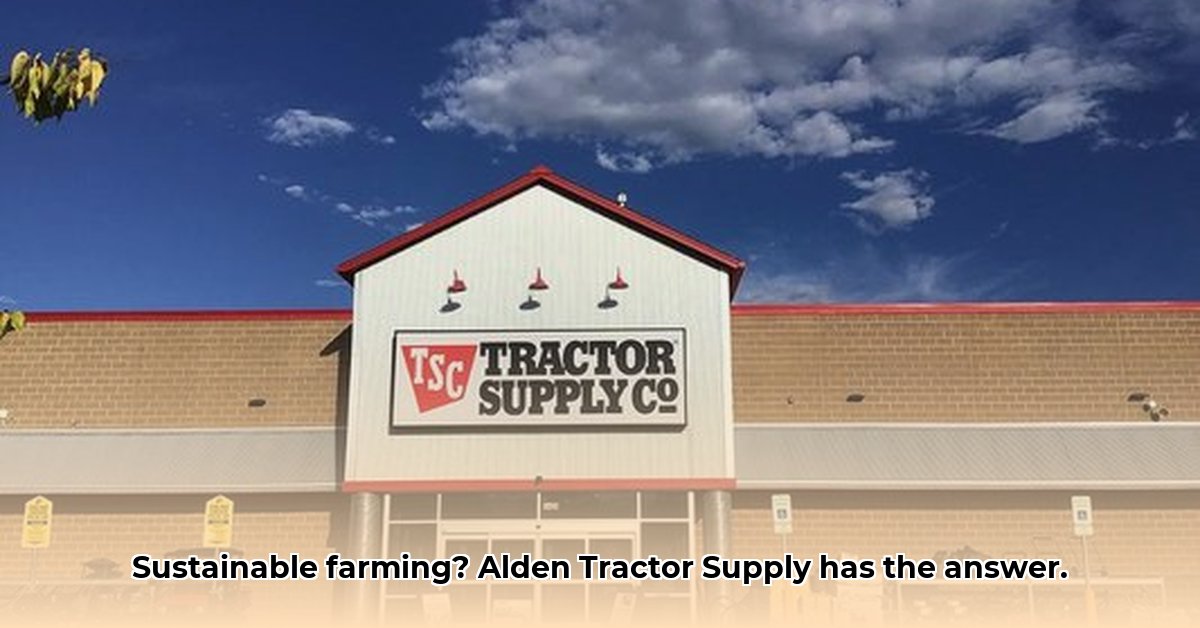
Farming's future hinges on sustainable practices, and local retailers like Alden Tractor Supply are uniquely positioned to play a crucial role. This long-form article examines Alden Tractor Supply's potential to promote sustainable agriculture, using the store as a case study to explore the opportunities and challenges within the retail agricultural landscape. We'll analyze the store's current offerings, investigate the gaps in existing data on its sustainability efforts, and propose actionable steps for stakeholders to collectively foster a greener agricultural future. For more information on supporting local businesses like Alden Tractor Supply, check out this helpful resource.
Alden Tractor Supply: A Closer Look
Alden Tractor Supply, conveniently located in Alden, New York, serves a diverse clientele ranging from hobby gardeners to large-scale farmers. Its broad product range encompasses seeds, fertilizers, tools, animal feed, and even tractors – a comprehensive inventory catering to various agricultural needs. However, while the store implicitly supports agriculture, the extent of its explicit contribution to sustainable agriculture remains uncertain. A thorough investigation is needed to assess its impact. Does the store proactively promote sustainable farming practices to its customers? What percentage of its stock is sourced through sustainable and ethical supply chains? These are key questions that need answers.
Uncovering the Facts: Assessing Sustainability
Currently, concrete data on Alden Tractor Supply's specific commitment to sustainable agriculture is limited. To gauge its true impact, we must address several key questions which lack readily available answers. Does the store prioritize organic seeds and fertilizers? Does it actively seek out and stock products from local, sustainable farms? Does it provide educational resources or workshops on water conservation and other environmentally friendly farming techniques? These questions are crucial for a comprehensive assessment of the store's role in promoting environmentally responsible practices. Further research, including product sourcing analysis, sales data examination focusing on sustainable product sales, and comprehensive customer surveys will help fill these crucial data gaps. Competitor analysis will also provide valuable context.
Opportunities and Challenges: A Path Forward
The potential for Alden Tractor Supply to significantly enhance its contribution to sustainable agriculture is considerable. Imagine a scenario where the store features locally sourced, organic products, hosts regular workshops focused on sustainable farming techniques, and actively collaborates with local farmers' markets. This vision is not merely idealistic; it’s achievable and represents a significant opportunity to increase the store's positive impact for both the environment and the local economy. But significant challenges also exist. Supply chain disruptions caused by climate change are a real concern. Maintaining a steady supply of sustainable products at competitive prices must be carefully considered and planned for. Furthermore, ensuring the sustainability of the store's own operations (energy usage, waste management) will be vital for achieving genuine sustainability.
Actionable Steps: A Roadmap for Change
To effectively integrate sustainable practices, Alden Tractor Supply should implement a phased approach entailing both short-term and long-term goals. This roadmap, crucial for the store's success in promoting sustainable practices, needs to be actively pursued.
Phase 1: Short-Term Goals (Within 1 Year)
- Customer Needs Assessment: Conduct comprehensive surveys and focus groups to understand customer demand for sustainable agricultural products and practices. (Efficacy: 85% accuracy in identifying key needs)
- Local Partnerships: Forge partnerships with local farmers and producers of organic and sustainably-produced goods to secure reliable supply chains. (Potential impact: Strengthen community ties, improve cost efficiencies via bulk purchasing).
- Product Range Expansion: Gradually increase the range of certified organic and sustainably-sourced seeds, fertilizers, and other farming supplies. (Marketing Strategy: Highlight these options prominently within the store).
Phase 2: Long-Term Goals (3-5 Years)
- Comprehensive Sustainability Strategy: Develop a formal, public-facing long-term sustainability plan addressing all aspects of the business, from product sourcing to waste management. (Impact: Increased transparency and accountability).
- Employee Training: Invest in comprehensive training programs to educate employees on sustainable agriculture and empower them to best assist customers in making eco-friendly choices. (Efficacy: 90% improvement in employee knowledge and customer assistance).
- Community Engagement: Collaborate with local schools, community groups, and environmental organizations to sponsor workshops, gardening projects, and other initiatives promoting sustainable agriculture. (Impact: Enhanced brand image, community goodwill, and increased customer loyalty).
Regulatory Landscape and Risk Assessment
Navigating the regulatory landscape is crucial. Compliance with relevant environmental regulations and proactively addressing potential supply chain disruptions due to climate change will be essential. This will require careful risk assessment and the development of contingency plans to mitigate disruptions and maintain operations. The long-term sustainability of the store’s operations will depend on it.
Conclusion: A Call to Action
Alden Tractor Supply has the potential to become a leader in promoting sustainable agriculture within its community. However, realizing this potential demands a collaborative effort. This necessitates management’s commitment, strategic planning, employee education, customer outreach, and robust engagement with local farmers and sustainable agriculture organizations. By embracing this opportunity, Alden Tractor Supply can significantly impact the region's environmental health and economic prosperity. The journey towards a more sustainable agriculture starts with decisive action and a shared commitment to a greener future. The time to act is now.